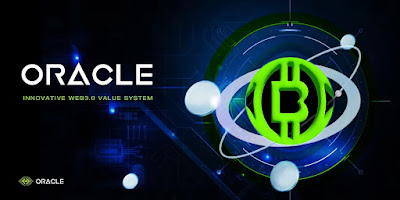Oracle builds a complete set of mature profit system and insurance mechanism with oracle network as the underlying infrastructure
The financial management of digital assets is becoming the next trillion market, fully awakening. In addition to the professional digital currency wealth management platform, there are many wallets and exchanges with wealth management functions, and there are hundreds of players in the industry.
The oracle network can connect the blockchain and real world data. The oracle enables smart contracts to access data that exists outside the blockchain. For example, a protocol may want to trigger its smart contract based on security prices, macroeconomic indicators, or even weather data. The use of oracle can greatly increase the understanding of smart contracts on the external situation of the blockchain, so that they can react to external events through specific actions, which will be crucial.
Oracle took advantage of the technology of oracle network to break the deadlock of poor liquidity and convenience of traditional financial assets, and walked in the forefront of the times, stood up to the forefront and actively promoted the process of automated investment trading.
Oracle builds blockchain insurance product system to build a comprehensive decentralized architecture
Oracle can introduce external data sources and events for blockchain insurance applications, help decentralized insurance products make claims decisions, and arrange future automatic claims. The technological innovations such as blockchain and smart contract that have emerged in recent years have the potential to solve the problem of insurance opacity and eliminate mutual distrust due to lack of transparency.
The combination of blockchain, smart contracts on the chain and decentralized oracle is likely to upgrade the insurance infrastructure, which can not only solve the transparency problem, but also simplify the entire insurance process and cover more vulnerable groups around the world. Decentralized insurance protocols can improve operational efficiency, reduce costs, minimize trust, and ultimately shorten insurance claims, arbitration, and payment processes.
The starting point of blockchain insurance is smart contracts. Smart contracts are software that runs and stores on distributed decentralized ledgers (i.e. "blockchains"). Smart contracts are automatically executed based on the Boolean logic of if/then, which can replace the claims module in traditional insurance protocols, truly achieve credibility and transparency, and ensure that the arbitration process cannot be tampered with. These automatically executed if/then logic can be widely used in various insurance products. If the insured's flight is cancelled, automatic insurance claims will be triggered.
If the insurance smart contract receives a verifiable death certificate, the life insurance will automatically start the claim settlement process. Smart contracts are very robust. They can automatically execute most insurance links and significantly reduce related costs while ensuring transparency and fairness. Both weather insurance and marine insurance can realize unlimited innovation potential for traditional insurance models. If smart contracts can seamlessly access external data and fully guarantee privacy and security, they will have the potential to subvert many traditional insurance models and spawn countless new insurance models.
Oracle NFT builds strong data interoperability
Oracle has strong data interoperability. Compared with ETH, BSC, Solana, etc., Oracle provides a more powerful NFT price discovery capability, which can greatly promote the circulation of NFT value. Oracle can build NFT circulation trading mechanism by ensuring the authenticity, reliability and security of NFT data. Oracle is committed to promoting the historic process from Web 2.0 to Web 3.0.
In the NFT segment, it will promote global famous brands to embrace Web 3.0, and will also create a number of brand assets belonging to Web 3.0. Whether the NFT is point-to-point or point-to-point pool, the smart contract does not have access to the price and quantity in the market transaction, and cannot correctly handle the flow and security of assets.
With the help of Oracle oracle data writing, the smart contract can determine the amount that the borrower/borrower can lend/mortgage, and determine whether the mortgaged NFT needs to be liquidated when the market price changes, and stop loss in a timely manner. In terms of iteration and change, the dynamic NFT uses the data input of the oracle machine, and the smart contract can set conditions. When the conditions are triggered, the NFT will have the possibility of further changes.
These contents indicate that rewards can be observed and obtained on the data input by the oracle machine. At the same time, the oracle machine can randomly assign the characteristic attributes of each NFT to ensure the fairness of the rarity of each NFT. Oracle NFT has four levels: N, R, SR and UR.
Oracle has been strongly supported by various investment institutions, which has made Oracle have gained influence that can not be ignored in major countries around the world. In the future, Oracle will also continue to work with its industrial chain partners to promote the process of transaction digitalization.






Comments
Post a Comment